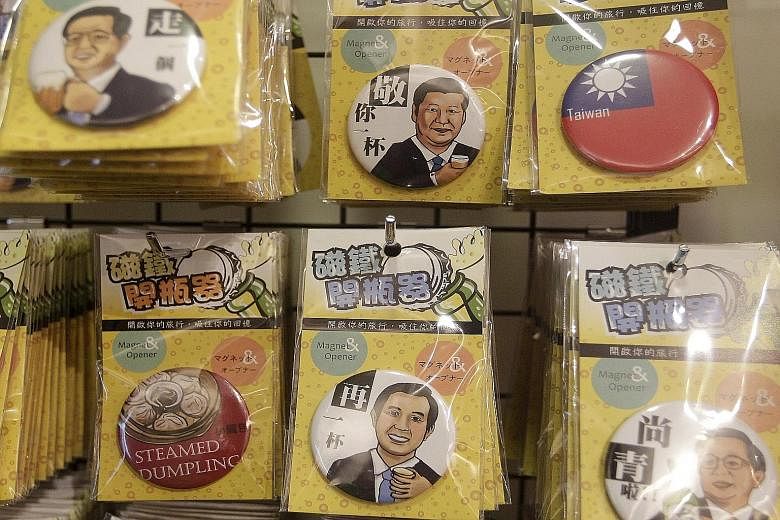Nestled in the genteel enclave of Tianmu in north Taipei, an imposing building looks out on to a bubbling brook. In front, 30 flagpoles stand - but many are bare. Just over half don the colourful flags of various nations - mostly in Africa, Latin America and the Caribbean.
Soon, there could be even fewer of these emblems at Taiwan's Diplomatic Quarter, housing most of the island's formal allies' embassies.
An unyielding Beijing, keen to send out the message that it will not compromise on Taiwan, is expected to sit on the island's diplomatic allies - now numbering 22 - to cut ties with it and switch allegiance to the People's Republic of China. That will be one way of punishing Taiwan's new president, widely anticipated to be Ms Tsai Ing-wen of the pro-independence Democratic Progressive Party (DPP) after Saturday's polls.
The sticking point is that Ms Tsai is non-committal on the so-called 1992 Consensus. It recognises that there is one China but with differing interpretations of what that means.
She has said it is "one option, but not the only one" in the question of Taiwan's relationship with China. Dr Lo Chih-cheng, an adviser to Ms Tsai on cross-strait ties, tells The Straits Times the other options will allow for "maintaining the status quo without the 1992 Consensus".
Ms Tsai will announce her China policy on May 20, when the new leader is inaugurated. Before that, "test balloons will be floated".
Whatever they are, Beijing will not be happy if the 1992 Consensus is not accepted, says Professor Wu Yu-shan of the Institute of Political Science at Academic Sinica.
It will be a short order to then squeeze Taiwan's already decimated international space. "Already, four or five of these allies are in Beijing's pocket," he says.
A diplomatic truce of sorts was in place in the past eight years. While some of Taiwan's allies were keen to defect and reap the benefits of formal ties with the world's second-largest economy, Beijing had rebuffed most of their overtures to support President Ma Ying-jeou of the Kuomintang (KMT), who endorses the 1992 Consensus and has made closer cross-strait ties a centrepiece of his government.
Things are set to change. And the impact will be significant.
Though most of the allies are, as some put it, "tinpot nations and despot leaders" won over by Taiwan's chequebook diplomacy, they are highly symbolic in ensuring the island is not totally isolated in the international arena.
A hard-line tactic by Beijing will represent a sharp swerve from conciliation to coercion over this 36,000 sq km island that looms large in the Chinese narrative: Taiwan has to be returned for China's "century of humiliation" to end.
Chinese President Xi Jinping has said categorically: "Denying the 1992 Consensus is to challenge the legal basis of both sides of the Taiwan Strait belonging to one China. It will undermine the fundamental interests of the nation and shake the cornerstone of cross-strait ties. There will be no possibility of peace or development."
While war remains highly unlikely, Beijing will almost certainly deploy other weapons in its arsenal.
These range from freezing formal dialogue to turning off the tap of economic concessions, such as Chinese tourists being allowed to visit Taiwan.
China could also accelerate the build-up of military capabilities that are relevant to Taiwan, "conducting military exercises in a blatantly intimidating way", believes Dr Richard Bush, former director of the American Institute in Taiwan, the US' de facto embassy.
The historic meeting between Mr Ma and Mr Xi in Singapore in November was also meant to underscore the "relative deprivation" for Ms Tsai if she remains "recalcitrant" on the 1992 Consensus, says Prof Wu.
Such a stand-off is driven by a complex interplay of domestic and international dynamics .
Ms Tsai is under two sources of pressure - the deep-green (pro-independence) base of supporters, and Beijing. The former is likely to gain dominance in the second half of her term as she struggles to maintain her popularity in the face of Taiwan's structural economic woes that cannot be easily resolved.
So while she may wish to tread carefully in cross-strait ties, she may eventually be forced to ratchet up pro-independence rhetoric to mollify the deep-green base. Her DPP predecessor Chen Shui-bian's trajectory is thus instructive. He had started on a conciliatory tone - he appointed a waishengren (KMT mainlander) as his premier, but ended his first term with a provocative referendum on relations with China. "It's not because Chen Shui-bian was mad but he needed to whip up support ahead of the next election," says Prof Wu.
Beijing, for its part, also has choices - and is likely to make the worse one. It could opt to understand what Ms Tsai is undergoing, and give her space to cultivate the moderate supporters. Or it could choose to go at her with most guns blazing.
Some, such as Prof Wu, believe it will be the latter, in view of Mr Xi's track record of uncompromising action in troubled peripheral areas such as Hong Kong, and his own need to consolidate his power.
Throw into this combustible mix other ingredients: Japan under nationalist Prime Minister Shinzo Abe and the US under a new president - both of which may not be averse to giving Taiwan a little nudge - and the neighbourhood looks set for some frisson.
Others though are more sanguine that "peaceful accommodation" could be the way. Says Chinese foreign policy specialist Edward Friedman: "A super-confident Xi believes that China's rise is unstoppable. Therefore, he should see no reason to derail China's rapid advance by a risky act against Taiwan."
DPP insiders also believe that Beijing will have no choice but to deal with the party in power.
What is key, says former premier Yu Shyi-kun, is DPP's vote share on Saturday.
"If Tsai gets a high margin and DPP wins more than half in the legislature, Beijing can't look so petty as to reject talking to us."
Adds Dr Lo: "Beijing can use various means to coerce Taiwan, but that will have the negative impact of pushing Taiwan further away."
READ MORE ONLINE
More stories on Taiwan's upcoming elections here: http://str.sg/ZHAb


